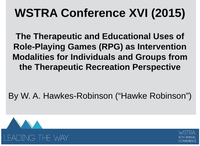RPG as Therapy Presentation - Seattle Childrens Hospital WSTRA Con 16
The presentation is 90 minutes including a short Q&A session. I plan to refine and break this presentation into smaller 15-minute segments to be more manageable and allow more time on the research information side since all the background information I needed to provide to that particular audience before I could then make the TR associations in term they would understand ate up most of the time.
You can view/download the PDF version of the slide show here (still needs some fixing especially the citations pages at the end):
Several participants stated they will now plan future program plans with RPG as an intervention modality, and they would like my help in developing the programs, including a group from Canada as well! I have since been contacted by several attendees requesting guidance in implementing RPG programs at their facilities.
I am an undergraduate (senior, part-time) student at Eastern Washington University (EWU) working on an interdisciplinary degree in Recreation Therapy, Music Therapy, Neuroscience, & Research Psychology. My research efforts have been covering various areas, and noting any potential uses of RPG as an intervention modality for therapy and education. Other areas have been related to developing some program trials and using RPG from a Recreation Therapy perspective for Autism spectrum toddlers, youth, & adults, as well as designing program plans (though not yet implemented) for Traumatic Brain Injury, PTSD, and other populations. While I have been fortunate enough to run a few trial programs, and some questionnaire-based efforts, I have not yet had the resources to implement the desired controlled studies, but I am working toward such goals. Most of my research is using my own time and resources and not in any way linked with the university (the 164 respondents to the gender bias self-report questionnaires for example), while some efforts have been as an undergraduate student at Eastern Washington University.
Link to video: http://youtu.be/zWsmElmhjdk
WSTRA DESCRIPTION This session will provide background and research information about the effects of role-playing gaming in all forms upon participants. It will address the many inculcated concepts in popular culture regarding role-playing games and gamers, and present the existing relevant research. All formats of role-playing gaming will be discussed, including Choose Your Own Adventure (CYOA) books, offline and online computer-based role-playing games, live-action role-playing (LARP), and tabletop role-playing games. This will include the potential benefits, and deficits, from participating in these various recreational activities. The session will initially provide examples of each game format in a typical recreation setting, then proceed with the existing research using RPG for various educational and therapeutic interventions from other disciplines (psychiatry, psychology, education, sociology, cognitive, behavioral, etc.), then illustrate how the application of TR methodologies are an excellent fit for these activities as an intervention modality for many populations in group and individual settings.
Several participants stated they will now plan future program plans with RPG as an intervention modality, and they would like my help in developing the programs, including a group from Canada as well! I have since been contacted by several attendees requesting guidance in implementing RPG programs at their facilities.
I am an undergraduate (senior, part-time) student at Eastern Washington University (EWU) working on an interdisciplinary degree in Recreation Therapy, Music Therapy, Neuroscience, & Research Psychology. My research efforts have been covering various areas, and noting any potential uses of RPG as an intervention modality for therapy and education. Other areas have been related to developing some program trials and using RPG from a Recreation Therapy perspective for Autism spectrum toddlers, youth, & adults, as well as designing program plans (though not yet implemented) for Traumatic Brain Injury, PTSD, and other populations. While I have been fortunate enough to run a few trial programs, and some questionnaire-based efforts, I have not yet had the resources to implement the desired controlled studies, but I am working toward such goals. Most of my research is using my own time and resources and not in any way linked with the university (the 164 respondents to the gender bias self-report questionnaires for example), while some efforts have been as an undergraduate student at Eastern Washington University.
Link to video: http://youtu.be/zWsmElmhjdk
WSTRA DESCRIPTION This session will provide background and research information about the effects of role-playing gaming in all forms upon participants. It will address the many inculcated concepts in popular culture regarding role-playing games and gamers, and present the existing relevant research. All formats of role-playing gaming will be discussed, including Choose Your Own Adventure (CYOA) books, offline and online computer-based role-playing games, live-action role-playing (LARP), and tabletop role-playing games. This will include the potential benefits, and deficits, from participating in these various recreational activities. The session will initially provide examples of each game format in a typical recreation setting, then proceed with the existing research using RPG for various educational and therapeutic interventions from other disciplines (psychiatry, psychology, education, sociology, cognitive, behavioral, etc.), then illustrate how the application of TR methodologies are an excellent fit for these activities as an intervention modality for many populations in group and individual settings.
Document Actions

